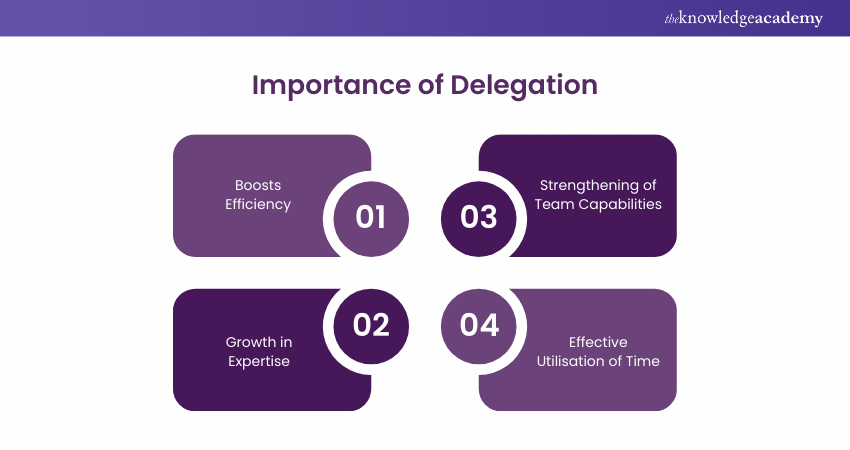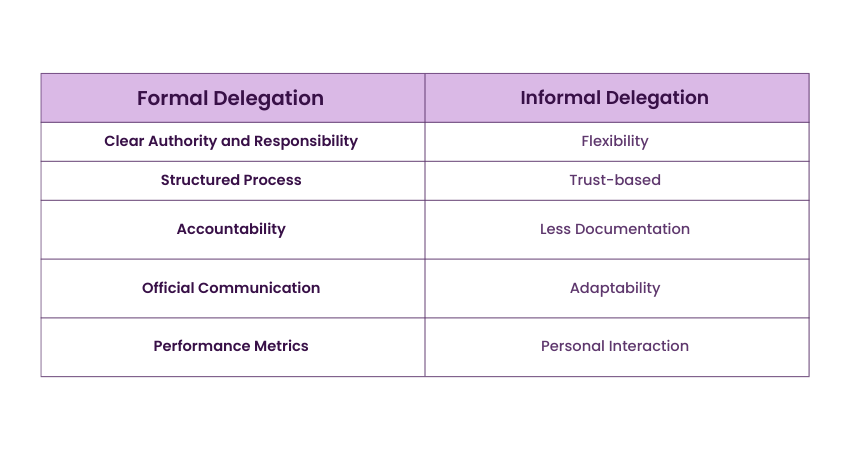We may not have the course you’re looking for. If you enquire or give us a call on 01344203999 and speak to our training experts, we may still be able to help with your training requirements.
We ensure quality, budget-alignment, and timely delivery by our expert instructors.

Picture yourself managing a team tasked with delivering a high-stakes project under a tight deadline. How do you ensure that every aspect of the project is handled efficiently and effectively? This is where understanding "What is Delegation" becomes crucial. Delegation isn't just about passing off work; it's a strategic method to boost your team's productivity and morale.
By assigning tasks that align with your team members' strengths and interests, this strategy eases your workload and empowers your team to develop and thrive. So, what is Delegation, and how can it benefit your organisation? In this blog, we will talk about the different types of Delegation and reveal the numerous advantages it brings to the workplace.
Table of Contents
1) What is Delegation?
2) Importance of Delegation
3) Types of Delegation
4) Components of Delegation
5) Strategies for Successful Delegation
6) Conclusion
What is Delegation?
Delegation is the process of assigning tasks and initiatives to other team members. Understanding the principles of delegation helps ensure that responsibilities are distributed effectively, whether to balance workloads or to align tasks with a team member’s specific skills, interests, or priorities. Mastering when and how to delegate can significantly boost your effectiveness as a manager. In a broader context, delegation can also relate to concepts such as Delegated Legislation, where authority is granted to others to make decisions or create regulations within a certain framework.
Delegating not only helps you focus on your high-impact work but also provides team members with opportunities to engage in interesting projects. Effective Delegation fosters skill development within the team and allows members to cultivate new strengths.
Importance of Delegation
To know how Delegation plays an important role in the organisation, let's look at these points to understand its importance:

1) Boosts Efficiency
Delegation means tasks can be assigned to team members based on their skills and knowledge to achieve the best results. Because of this, jobs get done faster, and there is higher-quality output, which boosts the productivity of the whole organisation.
2) Growth in Expertise
By assigning tasks, leaders let the team members take on new responsibilities and work on assignments that usually fall outside their responsibilities. This experience shapes their expertise, creating a culture of learning and growth within the organisation.
3) Strengthening of Team Capabilities
Effective Delegation will instill a sense of responsibility and accountability among the team members. It will help them use their judgement and make decisions regarding their assigned tasks, increasing their work capabilities and encouraging teamwork and harmony.
4) Effective Utilisation of Time
Delegation liberates the leader's time to concentrate on more vital aspects of planning, decision-making, and financial performance. It guarantees that the head of the office can efficiently execute those activities that the team members can perform, thereby realising higher productivity.
Is Delegated Legislation Beneficial? Learn about the Advantages and Disadvantages of Delegated Legislation in shaping legal frameworks.
Types of Delegation
The main types of Delegation includes:
1) General or Specific Delegation
General Delegation occurs when a manager grants a subordinate the authority to perform all functions within their department, such as organising, planning, and directing. The manager maintains overall control and can provide guidance as needed.
In contrast, specific Delegation involves assigning a subordinate a particular task or function. These tasks are clearly defined. For example, an HR manager might ask an HR assistant to conduct interviews for a specific department over a set period.
2) Formal or Informal Delegation
Formal Delegation is integrated into the organisational structure. When someone is assigned a task, they also receive the corresponding authority, meaning everyone automatically gains authority according to their duties.

Informal Delegation arises from other circumstances. For instance, an individual might perform a task not because it is their duty, but because it is necessary for their job.
3) Lateral Delegation
Lateral Delegation occurs when authority is passed on informally. In some cases, an individual may require support with a task assigned by their manager. By understanding the delegation of authority, they can opt to seek help directly from colleagues, bypassing the need for formal approval from their supervisor to complete the task efficiently.
Components of Delegation
Delegation is a crucial management practice that involves three critical components. Every leader must know these dimensions because if they are not implemented, teams will not achieve success. Let’s discuss more about these components:
1) Responsibility
Responsibilities mean expected duties of the individual when they are allocated to do a specific task or job. The Delegate's responsibility is to carry out a given task by applying their skills and power of will. They are responsible for meeting the standards and deadlines upon receiving an assignment.
2) Authority
In this case, the role of an authority is to give the manager the power and the right to make decisions and take actions that may enable the work to be done. Here, the delegates are offered permission to carry on with different organisational resources, make decisions, and take actions that are in harmony with the goals of the project or task. A person having the required authority may do to his responsibility in a good way.
3) Accountability
Accountability means the Delegate should take responsibility, follow the chosen plan, and report on the results. This process implies that the task to be given out is reviewed through the outcomes, and the person (the one to whom you have delegated the job) is responsible for producing the desired results. Accountability comprises a clear notion that after the delegated tasks, the original delegator will hold the most crucial liability, either success or failure.
Gain the insights and tools to drive your team to success – join our Leadership Courses today!
Strategies for Successful Delegation
If you're in a leadership position, consider using the following steps to learn how to delegate effectively:
1) Know When to Delegate
The first step in delegating tasks is understanding when to delegate. For instance, if an employee is aiming for a Leadership role, you can assign them some leadership tasks to help build and enhance their skills.
Evaluate whether assigning a particular task can contribute to an employee's development or help them improve their skills before delegating any task.
2) Select the Right Candidate
Delegate tasks to a candidate who can effectively complete the task or benefit from it. If you notice that an employee needs to improve a specific skill, you can delegate tasks that will help them develop that skill.
For example, if an employee is uncomfortable speaking in public, you can assign tasks that require them to interact with others, thereby improving their communication and interpersonal skills. You may also delegate time-sensitive tasks to an employee who has the right skills and strengths to complete them promptly.
Discover the strategies to drive innovation and efficiency in your team – sign up for our Agile Leadership Training.
3) Explain Your Reasoning
Explain to your subordinates why you are assigning them a particular job. This helps them understand how to approach the assignment and boosts their morale. For example, if you ask an employee to conduct an interview, explain that you know they aspire to become a manager and that this task will help them develop managerial and leadership skills.
This can encourage them to take the task seriously and ask questions that will help them complete it successfully.
4) Describe the Goals and Provide Resources
Clearly describing the goals of a task helps the employee understand what is expected of them and what they need to achieve. Clear goals can help employees develop steps to complete the tasks, enhancing their creative and problem-solving skills.
Provide them with the necessary resources to perform the assigned task, ensuring they can complete the project successfully without delays or challenges.
5) Give Feedback
Provide feedback to your subordinates after they complete the tasks. This aids them to understand how they can improve for future assignments and can also build their confidence, especially if they meet your expectations.
Additionally, guide the employee if you notice their method is not effective, helping them perform better in the future.
Conclusion
In conclusion, understanding "What is Delegation" is crucial for effective management. By mastering the various types of Delegation, managers can distribute tasks efficiently, enhance team skills, and foster a collaborative work environment. The Benefits of Delegation are clear—implementing specific strategies can lead to increased productivity and a more empowered, capable team.
Learn the different types of Leadership and how to use them in different contexts with our Creative Leader Training!
Frequently Asked Questions
Give an Example of Delegation

An example of Delegation is a Marketing Manager overseeing several projects and is also responsible for creating social media campaigns. He will then delegate these tasks equally among their team members to close this project in the designated time.
What are the Risks of Delegation?

Delegation risks include miscommunication, leading to errors or unmet expectations. Assigning tasks to those without adequate skills can reduce work quality, while poor oversight may cause missed deadlines and lower productivity. Trust and accountability issues can arise, impacting team morale and efficiency.
What are the Other Resources and Offers Provided by The Knowledge Academy?

The Knowledge Academy takes global learning to new heights, offering over 3,000 online courses across 490+ locations in 190+ countries. This expansive reach ensures accessibility and convenience for learners worldwide.
Alongside our diverse Online Course Catalogue, encompassing 19 major categories, we go the extra mile by providing a plethora of free educational Online Resources like News updates, Blogs, videos, webinars, and interview questions. Tailoring learning experiences further, professionals can maximise value with customisable Course Bundles of TKA.
What is Knowledge Pass, and How Does it Work?

The Knowledge Academy’s Knowledge Pass, a prepaid voucher, adds another layer of flexibility, allowing course bookings over a 12-month period. Join us on a journey where education knows no bounds.
What are Related Leadership Courses and Blogs Provided by The Knowledge Academy?

The Knowledge Academy offers various Leadership Courses, including Leadership Skills Training, Agile Leadership Training, and Decision-Making course. These courses cater to different skill levels, providing comprehensive insights into Leadership Qualities.
Our Business Skills Blogs cover a range of topics related to Leadership, offering valuable resources, best practices, and industry insights. Whether you are a beginner or looking to advance your Leadership skills, The Knowledge Academy's diverse courses and informative blogs have you covered.
Upcoming Business Skills Resources Batches & Dates
Date
 Leadership Skills Training
Leadership Skills Training
Fri 27th Jun 2025
Fri 22nd Aug 2025
Fri 24th Oct 2025
Fri 12th Dec 2025






 Top Rated Course
Top Rated Course



 If you wish to make any changes to your course, please
If you wish to make any changes to your course, please


